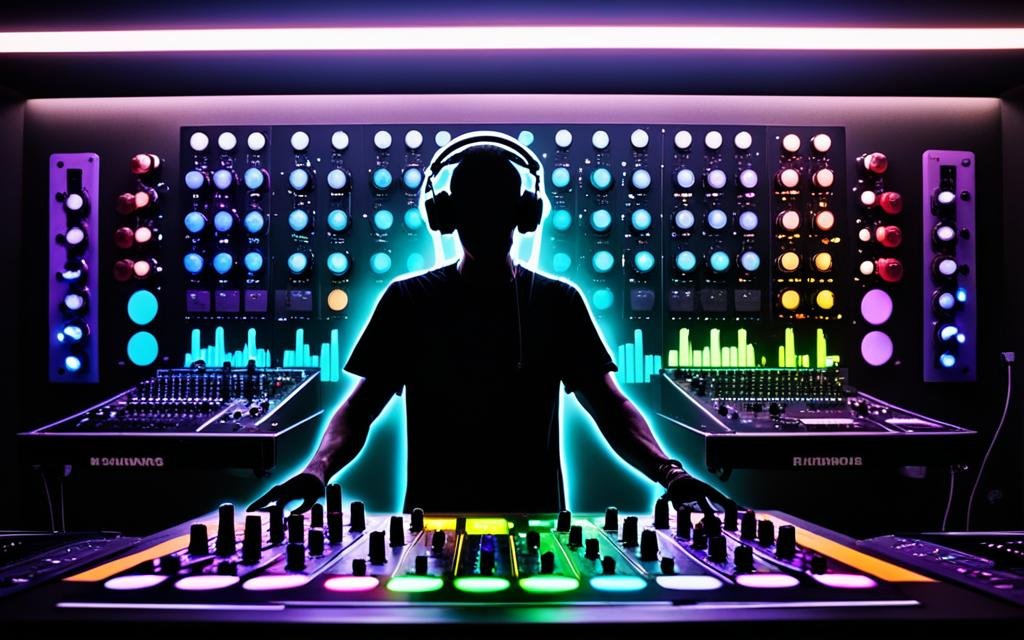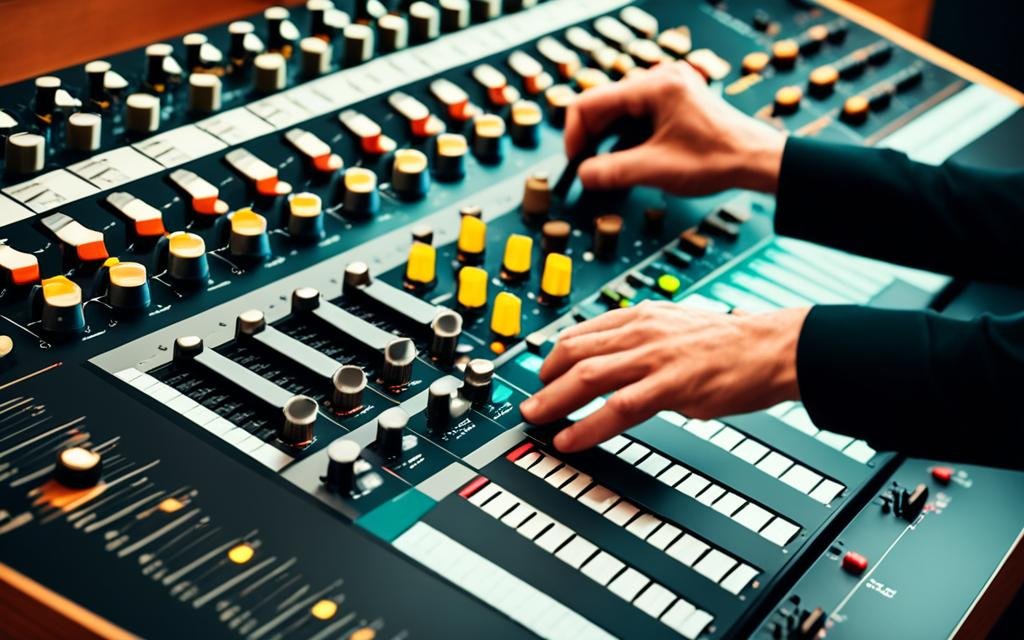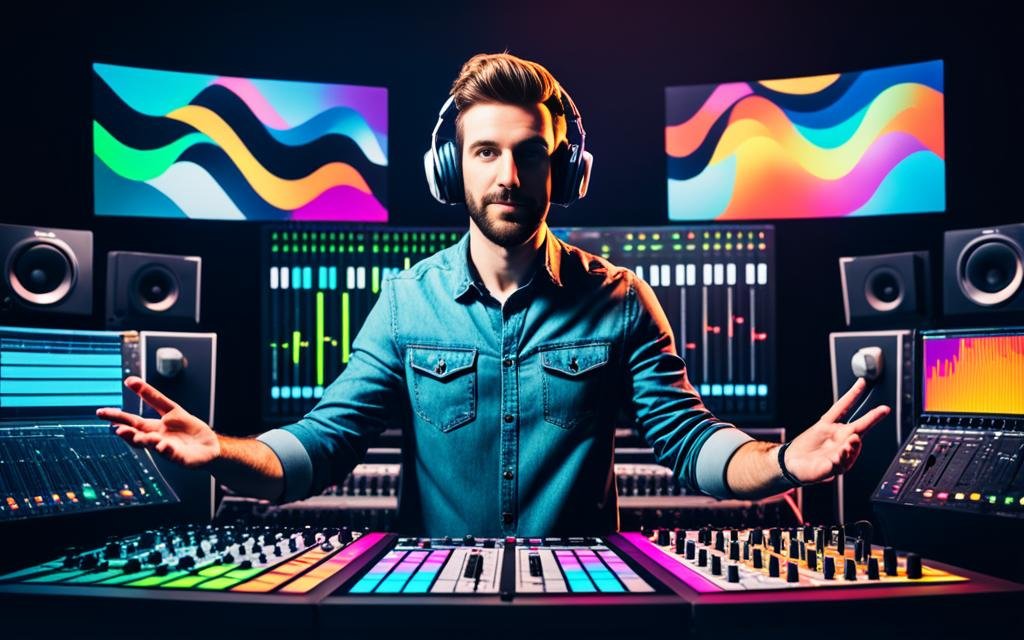As a music producer, I have always been fascinated by the intricate blend of creativity and technical skill that goes into shaping a piece of music. It’s a craft that requires a deep understanding of music theory, an ear for sound, and a passion for creating exceptional musical experiences. Whether you are just starting on your journey or looking to refine your skills, this comprehensive guide will provide you with valuable tips and insights to elevate your music production game.
In this article, I will share the best music production techniques, tricks, and advice that I have learned over the years, including some of the top industry secrets and expert advice for music producers. From improving your music production skills to discovering efficient methods and workflow, this guide covers essential tips for music producers of all levels.
Key Takeaways:
- Mastering the art and science of music production requires a blend of creativity and technical skill.
- Developing essential music production skills such as music theory, composition, and arrangement is crucial for producing exceptional music.
- Choosing the right music production software and mastering plugins and digital effects can enhance the quality and creativity of your productions.
- Active listening and analyzing production techniques across different genres can expand your musical knowledge and inspire new ideas.
- Collaboration, networking, and continuous learning are essential for success in the music production industry.
Finding Your Path in Music Production
Every music producer has a unique journey that leads them to this creative profession. It’s a path filled with passion, dedication, and the pursuit of excellence. In this section, we will explore the inspirational journey of Grammy-winning producer Julio Reyes Copello and gain valuable insights into how he discovered his passion for music production. We will also discuss the importance of identifying your own musical pursuits and passions, as they form the foundation for a successful career in music production.
The Inspirational Journey of Julio Reyes Copello
Julio Reyes Copello, a renowned music producer, has made a significant impact on the music industry with his exceptional talent and remarkable contributions. Born in Colombia, Julio started his musical journey at a young age, learning to play multiple instruments and developing a deep appreciation for different genres.
Throughout his career, Julio has worked with some of the biggest names in the music industry, including Jennifer Lopez, Marc Anthony, Ricky Martin, and Alejandro Sanz. His production credits include Grammy-winning and chart-topping albums, demonstrating his remarkable skills and artistic vision.
“Music has always been my passion. It’s my way of expressing myself and connecting with people on a deeper level. I believe that music has the power to change lives, and that’s what drives me to constantly push boundaries and create something meaningful.”
Identifying Your Musical Pursuits and Passions
Discovering your passion in music is a transformative experience that sets the stage for a fulfilling career in music production. It involves exploring different genres, experimenting with various instruments and production techniques, and understanding what resonates with you on a personal and creative level.
Take the time to reflect on your musical journey and identify the aspects of music production that truly inspire and excite you. Is it the process of composing melodies? The thrill of shaping sounds through sound design? Or perhaps the magic of bringing everything together in the mix?
By identifying your musical pursuits and passions, you can focus your energy and efforts on honing your skills in those areas. This self-awareness will not only guide your career choices but also fuel your motivation, as you pursue music production with purpose and authenticity.
Developing Essential Skills for Music Production
Becoming a proficient music producer requires a range of essential skills. Aspiring producers must not only master technical techniques but also hone their creative abilities to stand out in the competitive industry. Let’s explore the critical skills that every music producer should develop:
- Music Theory: A solid understanding of music theory helps producers compose melodies, chord progressions, and harmonies that evoke emotions and create engaging music.
- Composition: The art of composition involves arranging and structuring musical elements to create a compelling musical narrative. A strong composition allows producers to express their creativity and engage listeners.
- Sound Design: Sound design refers to the creation and manipulation of sounds using synthesizers, samplers, and audio effects. Mastering sound design allows producers to craft unique timbres and textures that make their music stand out.
- Arrangement: Arranging involves organizing musical elements such as verses, choruses, bridges, and instrumental sections to create a cohesive and dynamic musical journey.
- Critical Listening: Developing critical listening skills enables producers to identify flaws, balance levels, and make informed decisions on sound placement and overall mix.
To provide a more visual representation of the essential skills for music production, here’s a table summarizing these skills:
| Skills | Description |
|---|---|
| Music Theory | A solid understanding of harmonic structures, scales, and progressions. |
| Composition | The art of arranging musical elements to create engaging compositions. |
| Sound Design | The creation and manipulation of sounds using various synthesizers and effects. |
| Arrangement | Organizing musical elements to create a cohesive and dynamic musical journey. |
| Critical Listening | Acquiring the ability to identify flaws and make informed mixing decisions. |
By honing these essential skills, music producers can elevate their productions, master music production techniques, and unleash their creative potential to create exceptional musical experiences.
Mastering the Tools: Music Production Software
Music production software is an integral part of every producer’s arsenal. It provides the necessary tools and capabilities to create, mix, and master professional-quality music. Whether you’re a beginner or an experienced producer, choosing the right software can significantly impact the outcome of your projects.
Choosing the Right DAW for Your Production Style
One of the crucial decisions you’ll make as a music producer is selecting the right Digital Audio Workstation (DAW) for your production style. A DAW is software that allows you to record, edit, and arrange audio tracks, as well as apply effects and plugins.
There are several popular DAWs in the market, each with its unique features and interface. Some industry-standard DAWs include Ableton Live, Logic Pro, FL Studio, and Pro Tools. When choosing a DAW, consider factors such as your preferred workflow, available features, compatibility with your hardware, and your budget.

Navigating Plugins and Digital Effects
In addition to choosing the right DAW, understanding and utilizing music production plugins and digital effects can greatly enhance your productions. Plugins and effects are software-based tools that add additional functionality and creative options to your DAW.
Music production plugins include virtual instruments, synthesizers, and effects processors. These plugins allow you to create unique sounds, manipulate audio, and add texture and depth to your tracks. From EQs and compressors to reverbs and delays, there is a wide range of plugins available to help you achieve the desired sonic characteristics in your music.
When exploring and navigating plugins and digital effects, it’s essential to experiment and familiarize yourself with their capabilities. Whether you’re looking for a vintage analog sound or cutting-edge electronic effects, plugins provide endless possibilities to shape your music.
Choosing the Right Music Production Software
When it comes to selecting music production software, there is no definitive “best” choice. The right software for you will depend on your specific needs, preferences, and production style. It’s crucial to research and try out different options before making a decision.
Consider factors such as the compatibility with your computer’s operating system, the user interface, available features, and the overall workflow of the software. Reading reviews, watching tutorials, and seeking advice from experienced producers can also help you make an informed decision.
Ultimately, the key is to find a music production software that empowers your creativity, improves your workflow, and allows you to bring your musical ideas to life with ease.
Expanding Musical Knowledge Through Active Listening
Active listening plays a crucial role in the development of music producers. By immersing themselves in the world of music and actively engaging with different genres, producers can expand their musical knowledge and gain valuable inspiration for their own productions.
Learning from a Variety of Genres
One of the most effective ways to enhance musical knowledge is by listening to a wide variety of genres. Each genre offers unique musical elements, production techniques, and creative approaches. By exploring different genres, producers can gain exposure to diverse musical styles and learn how to incorporate various elements into their own productions.
Whether it’s studying the intricate rhythms of jazz, the intricate melodies of classical music, the infectious grooves of funk, or the hypnotic beats of electronic music, each genre provides valuable insights into musical composition, arrangement, and production.
By actively listening to different genres, producers can:
- Gain a deeper understanding of musical structures and arrangements
- Discover new instrumentation and sound design ideas
- Learn how to create compelling melodies and harmonies
- Explore different rhythmic patterns and grooves
- Understand the use of effects and production techniques unique to each genre
Listening to a variety of genres also helps producers cultivate a diverse musical palette, allowing them to bring fresh and unique elements into their own productions. Drawing inspiration from different genres can lead to innovative and boundary-pushing music that stands out in today’s competitive industry.
Analyzing Production Techniques Across Musical Styles
Active listening extends beyond simply enjoying the music. It involves specifically analyzing production techniques employed in different musical styles. By closely studying the production aspects of various genres, producers can gain valuable insights and learn new techniques to incorporate into their own productions.
When listening to a song, producers can pay attention to:
- The arrangement of instruments and vocals
- The balance of the mix and how different elements sit together
- The use of effects and processing techniques
- The overall sonic landscape and spatialization
By analyzing production techniques across different genres, producers can deconstruct and understand how specific sounds and textures are achieved. This knowledge can then be applied creatively in their own productions, enabling them to develop their unique style and sound.
Through active listening and analysis, music producers can expand their creative horizons, draw inspiration from diverse musical influences, and refine their production techniques. By engaging with a wide range of genres and studying the production techniques employed in each, producers can develop their own unique approach to music production and create compelling and innovative music.
Music Production Tips: Unveiling Industry Secrets
In this section, I will share insider tips and tricks from experienced music producers. By unveiling industry secrets, I aim to provide valuable insights and expert advice that can help aspiring producers take their skills to the next level. From workflow optimization and time management to creative techniques and sound design secrets, these tips will empower you to enhance your music production process.
One of the key secrets of successful music producers is efficient workflow optimization. By streamlining your process and maximizing your productivity, you can produce high-quality music more effectively. Consider organizing your project files, creating templates, and mastering keyboard shortcuts to save time and maintain a smooth workflow.
Time management is another crucial aspect of music production. Creating a schedule, setting realistic deadlines, and prioritizing tasks can greatly improve your efficiency. Allocate dedicated time for different stages of production, such as composing, arranging, recording, and mixing, to ensure a well-structured and timely project completion.
Creative techniques are what set exceptional music productions apart. Experiment with different sound design approaches, explore unique instrument combinations, and incorporate unconventional elements to add depth and character to your music. Don’t be afraid to think outside the box and push the boundaries of your artistic expression.
Sound design secrets can elevate the quality of your productions. Dive deep into the world of synthesis, sampling, and audio processing to create custom sounds that stand out. Learn to manipulate frequencies, layer different textures, and apply strategic effects to craft a distinctive sonic signature in your music.
Remember, the journey of a music producer is a continuous learning process. Embrace curiosity and actively seek knowledge from a variety of sources. Engage in online communities, join forums, and participate in workshops to gain insights from industry professionals and fellow producers. Networking and collaboration can provide valuable opportunities for growth and exposure.

By implementing these industry tips and tricks, you can unlock your creative potential and refine your music production skills. Discover your own unique approach, experiment, and never stop learning. The path to success in the music production industry is paved with dedication, passion, and a commitment to continual improvement.
The Art of Mixing and Mastering in Music Production
In the world of music production, the art of mixing and mastering plays a crucial role in creating a professional and polished sound. These processes involve shaping and refining the individual elements within a track, balancing levels, adding effects, and ensuring a cohesive and dynamic final product. By understanding the science behind sound synthesis and employing advanced mixing techniques, music producers can take their productions to the next level.
Understanding the Science of Sound Synthesis
Sound synthesis is the process of creating audio textures, tones, and sounds using various methods and technologies. By manipulating parameters such as frequency, amplitude, and timbre, music producers can shape and design unique sounds that contribute to the overall character of a track. Understanding the principles of sound synthesis enables producers to craft distinctive and engaging sonic landscapes that resonate with listeners.
Perfecting Your Tracks with Advanced Mixing Techniques
Advanced mixing techniques are the secret ingredients that make a mix stand out. These techniques involve precision and attention to detail to achieve a well-balanced and impactful sound. From EQ and compression to stereo imaging and automation, mastering these techniques allows producers to enhance the clarity, depth, and dimension of their tracks. By skillfully combining these tools, producers can create professional-level mixes that capture the essence of their musical vision.
Overall, the art of mixing and mastering is a blend of technical expertise and creative decision-making. It requires a deep understanding of sound engineering principles, meticulous attention to detail, and an ear for balance and harmony. By honing these skills and embracing advanced mixing techniques, music producers can elevate their productions and deliver an exceptional listening experience to their audience.

Setting the Stage: Constructing a Home Studio
Building a home studio is a vital step for aspiring music producers. It provides a dedicated space where creativity can flourish and ideas can come to life. In this section, we will discuss the essential equipment needed to set up a home recording studio, the importance of acoustics in home studios, and tips for designing a functional and productive workspace.
When it comes to home recording studio setup, having the right equipment is crucial. Here are some essential studio equipment that every music producer should consider:
- Professional-grade audio interface
- High-quality studio monitors or headphones
- A reliable computer with sufficient processing power
- A digital audio workstation (DAW) software
- A microphone suited for your recording needs
- A MIDI controller for virtual instruments
- A comfortable and ergonomic studio desk and chair
Acoustics play a significant role in the quality of recordings made in home studios. It is important to address acoustic issues such as unwanted reflections and standing waves. Consider investing in acoustic treatment solutions such as bass traps, diffusers, and acoustic panels to optimize the sound in your room.
When designing your home studio, keep in mind the placement of equipment and furniture to ensure a functional and efficient workspace. Arrange your equipment in a way that promotes easy access and a comfortable workflow. Also, consider factors like lighting, ventilation, and cable management to create a conducive environment for creativity.
Remember, setting up a home studio is not just about the technical aspects. It is about creating a space that inspires you and allows you to fully immerse yourself in the music production process. Tailor the design of your home studio to reflect your personal style and preferences.
By creating a professional environment in your own space, you can unleash your creativity, experiment with different sounds, and produce high-quality music right from the comfort of your home.
Collaboration and Networking: The Heart of Industry Success
Collaboration and networking play crucial roles in achieving success in the music production industry. As an aspiring producer, it is essential to recognize the benefits of collaborating with other producers, sharing knowledge, and learning from each other’s experiences. By engaging in collaborative music production, you gain the opportunity to expand your skills, explore new techniques, and push the boundaries of your creativity.
When you collaborate with other producers, you create a network of peers who can provide valuable feedback and insights. This peer collaboration fosters a supportive community where you can share ideas, troubleshoot challenges, and collectively elevate the quality of your productions. Additionally, collaborative music production allows you to tap into a diverse range of talents and expertise, enabling you to create more dynamic and unique musical experiences.
Learning from Collaboration with Other Producers
One of the most significant advantages of collaborating with other producers is the opportunity to learn from their experiences and perspectives. Each producer brings a unique approach to music production, and by working together, you can discover new techniques, workflows, and creative processes. Through collaboration, you can gain valuable insights into different genres, production styles, and industry trends.
Furthermore, collaborating with other producers exposes you to different working methods and problem-solving approaches. As you navigate the collaborative process, you’ll encounter new challenges and learn how to adapt and find common ground. This ability to collaborate effectively and learn from others is invaluable in an industry that thrives on innovation and adaptation.
Ultimately, collaboration with other producers opens doors to new inspirations, expands your skillset, and accelerates your growth as a music producer.
Building Your Network and Finding Opportunities
In addition to collaboration, building a strong network of industry connections is crucial for finding music production opportunities and advancing your career. Networking allows you to establish meaningful relationships with industry professionals, including artists, managers, labels, and other producers.
Here are some strategies to build your network and find opportunities:
- Attend music industry events, conferences, and workshops where you can meet and connect with like-minded professionals.
- Utilize online platforms and communities dedicated to music production, such as forums, social media groups, and collaboration platforms.
- Reach out to artists or producers whose work inspires you and express your interest in collaborating or learning from them.
- Join local music production communities or organizations to network with professionals in your area.
Networking is not just about promoting yourself and seeking opportunities. It is about fostering genuine connections, offering support, and contributing to the music production community. By building a strong network, you increase your visibility, gain access to a wider range of opportunities, and establish yourself as a respected professional in the industry.
Remember, collaboration and networking are not just means to an end but rather ongoing practices that contribute to your growth and success as a music producer.
To illustrate the power of collaboration and networking, let’s hear from acclaimed producer Mark Ronson:
“Collaborating with other musicians and producers has been instrumental in shaping my sound and expanding my sonic palette. It’s through these collaborations that I’ve discovered new approaches, learned invaluable techniques, and ultimately grown as a producer. Building strong industry connections and being open to collaboration has been the foundation of my success.”
– Mark Ronson, Grammy-winning producer
In the next section, we will explore the process of creating and producing your own music, empowering you to bring your creative vision to life.
Creating and Producing Your Own Music
As a music producer, one of the ultimate goals is to create and produce your own original music. This is where your unique artistic vision can truly come to life. To achieve this, it’s important to understand the music production process from start to finish.
The process begins with composition and arrangement. This is where you lay the foundation for your music by creating melodies, harmonies, and song structures. You have the freedom to experiment and let your creativity flow during this stage.
Once you have your composition and arrangement in place, it’s time to move on to the production phase. This involves selecting the right sounds, instruments, and effects to bring your music to life. You’ll work on recording, mixing, and mastering to achieve the desired sound quality and balance.
Throughout the process, it’s crucial to strive for uniqueness and originality. Find your own sound and style, and let it shine through in every aspect of your production. This is what will set you apart from others and make your music stand out.
“Creating music is a deeply personal and expressive journey. It’s about sharing your emotions, stories, and experiences through sound. Don’t be afraid to be yourself and experiment with different ideas. Your uniqueness is your biggest asset.”
By developing your own unique sound, you can create music that resonates with listeners and leaves a lasting impact. Embrace the creative process, refine your skills, and never stop exploring new possibilities.
Embracing Feedback and Continuous Learning
As a music producer, I recognize that learning and growth are essential parts of my journey. It is crucial to embrace feedback, both positive and constructive, to refine and improve my productions. Receiving feedback from industry professionals, fellow producers, and even listeners provides valuable insights and perspectives that can elevate the quality of my work.
Moreover, continuous learning is key to staying ahead in the ever-evolving field of music production. From expanding my technical skills to exploring new creative techniques, I understand the importance of investing time and effort into my personal development as a producer. By continuously learning and honing my craft, I can enhance my abilities and deliver high-quality productions.
Finding the Balance Between Creativity and Technical Skill
In music production, finding the right balance between creativity and technical skill is crucial. While technical knowledge is necessary for executing production techniques effectively, it is creativity that brings life and originality to a track. Nurturing both aspects is essential to create music that resonates with listeners.
I strive to cultivate my technical skills through hands-on practice, online tutorials, and courses that focus on various aspects of music production. Simultaneously, I actively explore different avenues to foster my creativity, such as experimenting with sound design techniques, collaborating with other artists, and drawing inspiration from diverse musical genres.
Keeping Up With Evolving Music Production Trends
In the dynamic world of music production, staying updated with evolving trends and technologies is vital to remain relevant and competitive. New techniques, tools, and genres emerge constantly, influencing the direction of the industry. By staying informed and adaptive, I can keep my productions fresh and ensure they resonate with current listeners.
To stay updated, I regularly engage with industry resources, including online forums, blogs, and social media communities, where producers share insights and discuss emerging trends. Additionally, attending workshops, conferences, and industry events allows me to network with fellow professionals and learn from their expertise.
Conclusion
In conclusion, the music production industry is constantly evolving, offering a world of exciting opportunities for aspiring producers. As technology continues to advance, new doors open, allowing producers to explore innovative production techniques and create groundbreaking music. The future of music production is bright, with endless possibilities for those who are passionate and committed to their craft.
Staying inspired is essential for success in the music production industry. As a producer, it is important to continuously seek inspiration from various sources, such as different genres and styles of music. By immersing yourself in a diverse range of musical influences, you can infuse unique elements into your productions, setting yourself apart from the crowd.
However, staying inspired is not enough on its own. Commitment is equally crucial. Producing music requires time, effort, and dedication. It is essential to invest in continuous learning, honing your skills, and staying updated with the latest trends and technologies. By embracing feedback and seeking opportunities for collaboration, you can further enhance your abilities and broaden your network, paving the way for a successful career in music production.









